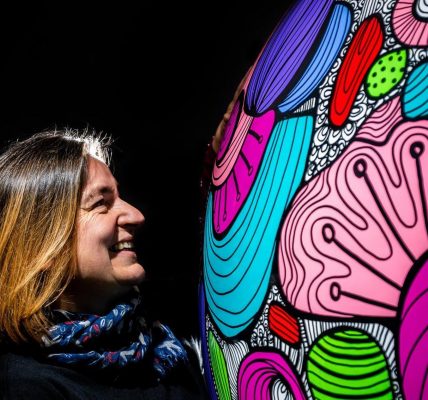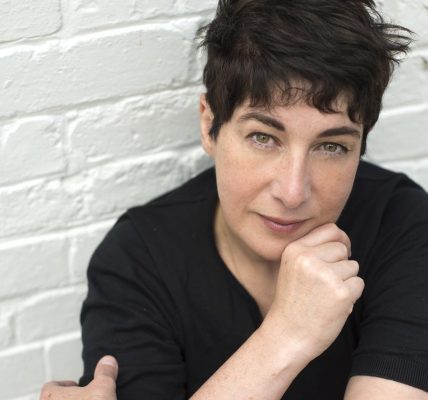Michael Rosen: 'I probably had a one in 10,000 chance of surviving Covid'
Former children’s laureate Michael Rosen reflects on how he cheated death from Covid after spending 47 days in intensive care and how it has changed his life.
Michael Rosen looks like a sprightly 74-year-old, wispy curls of grey hair and short beard framing his long friendly face, as he tells me about the exercise regime he has undertaken to get him back to full health after his terrifyingly close brush with death from Covid.
“I’m doing the plank, the bridge, weights, walking up and down stairs, I have these resistance bands which I get out when I’m watching football with my son – it drives him mad,” says the former children’s laureate who has delighted children over the years with his most famous book, .
“If I overdo it one day, I’m pretty smashed the next, which I think is a residue of Covid, so I have to be careful. I walked up Muswell Hill [a notoriously long, steep hill in North London, where he lives] recently – it was a big challenge I’d been afraid of.”
A year ago, at the start of the pandemic, the award-winning poet, performer and broadcaster entered a nightmare that would last for months when he was rushed to hospital suffering from coronavirus, almost three weeks after first displaying symptoms of breathlessness.
He was diagnosed online firstly by a paramedic and later by someone on 111, who suspected he was getting over a virus and advised him to take paracetamol and ibuprofen.
When things didn’t improve, his wife Emma finally contacted a GP neighbour and friend, who delivered an oxygen saturation probe to their home while she waited on the doorstep. His reading was 58 per cent (normal is anything over 95 per cent). Technically, he should have been unconscious.
“Your life hangs by a thread at that moment and it’s only a lucky coincidence that our GP friend was around, and luck that she had the oxygen probe in her bag. At that moment, I had probably a one in 10,000 chance to survive and it was because of that set of coincidences that I did,” he explains candidly.
So urgent was his case, that his wife and daughter helped him into the car and drove him to A&E at the Whittington Hospital in London. The consultant said that any later would have been too late.
He spent 47 days in intensive care, most of which were in an induced coma. Doctors gave him a 50:50 chance of survival. April and most of May have been wiped from his memory. Complications included blood clots in his lung passageways and his brain, for which he was put on blood thinners.
“I don’t remember any of it. Once they put you under, you are unconscious in every sense of the word. The mysterious bit is that they see you wake up, but I have no memory of that period of being woken up.”
His latest book,, is a touching and, at times, surprisingly amusing reflective collection of poetry and words of his battle with Covid and his recovery.
The blanks in his memory are filled in with the observational diaries placed at the end of his bed by the nurses and doctors who looked after him, who charted his slow recovery as his breathing gradually improved and he received less support from the ventilator, between bouts of agitation and hallucinations.
His first memories came about 10 days after he’d been moved from intensive care to a ward, even though he had been awake and talking and, at times, lucid, he explains. They had put mitts on his hands to stop him pulling at his tubes. He had no concept of the time he had spent in intensive care.
“Emma said, ‘You’ve been in intensive care’ and I just thought they’d been looking after me intensively,” he recalls. “I had no idea about this coma thing.”
Initial physiotherapy was exhausting, he recalls. So weak was he, that at first he was winched into a wheelchair and wheeled to a window where Emma and the children were waiting.
Taking even one step felt impossible at the beginning, and Emma sent in a furry blanket and duvet to comfort him and make him feel safe, and giant yellow sultanas to add sweetness to his morning porridge. The family created a playlist for him and spoke to him on FaceTime.
He slowly started to come round, to engage in the present, and recalls hearing the nurses whispering about somebody having died. He had no idea a pandemic had swept the country.
“I realised death was in the air and was getting a sense that people were dying of this thing, but I hadn’t seen a newspaper.”
He was eventually transferred to a rehabilitation hospital, where he spent three weeks.
“Standing up was the hardest thing at first,” he recalls. “I just thought I’d never stand up again. I had a powerful sense that I would be in a wheelchair for the rest of my life.”
He says he had a fatalistic attitude to that prospect, a sort of ‘Oh well, I’m a wheelchair person now’ until the physiotherapists and occupational therapists worked their magic on him.
When he came home, he agrees that he suffered a degree of delayed shock.
“There were several times when I was crying and not in control of why I was crying. Insofar as I understand anything about post traumatic stress disorder, I think that’s one of the things people describe.”
Nearly a year on, he says he’s OK, although he has numbness in his toes, an eye that has gone ‘foggy’ and deafness in his left ear, as a result of the illness.
“They’ve told me the ear won’t change, because my auditory nerve was damaged, and they don’t know about the eye, but I don’t see any improvement in the last three or four months, although I can see some of the letters on my keyboard. But my general strength keeps improving, so I’m in quite good nick, in that sense.
“I lost my toenails because Covid attacks the smallest capillaries in the body. But some people came off worse and lost their toes, because effectively, they got what is like frostbite.”
Life has changed since his Covid experience, he reflects, although he hasn’t sought counselling. He says that writing is his therapy.
“It’s affected my mentality, made me more cautious and less certain about everything. I faff about. Having so nearly died, there’s a feeling of uncertainty about life in general.”
And he’s started to feel angry at the way the pandemic was handled at the beginning.
“I have two magnets – one is regret that I’m not the person I was. I haven’t got that energy or assuredness. The other thing is anger, because I’m fairly sure that in February and March [last year] senior people in government and scientists were entertaining this idea of herd immunity without vaccination.
“They knew this would entail the deaths of tens of thousands of people and this seems to me frightening. It makes me angry. It was terrible that some people were supporting the idea that culling the old would be quite a good idea. Suddenly we had a league table of people who were less entitled to survive than others.”
For a man who was on death’s door less than a year ago, he’s busier now than he was before the pandemic, doing live streams to schools across the country, and speaking to intensive care nurses about why patient diaries are so important. Later this year, he’ll be talking to psychiatrists about the psychological effects of Covid. He has also joined the Facebook long-Covid group.
He admits that his brush with death has led him to thoughts about the legacy he will leave – but he needn’t worry.
“The messages that Emma received while I was ill were overwhelming. And when I posted a tweet when I came round, it got 40,000 likes! It’s a bit like having an obituary and messages of appreciation when you’re still alive.”










